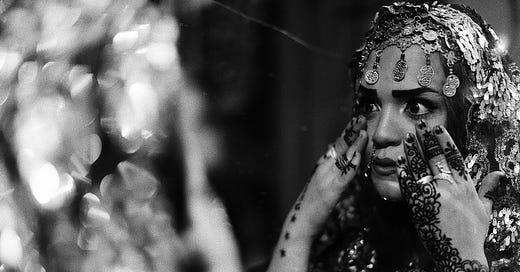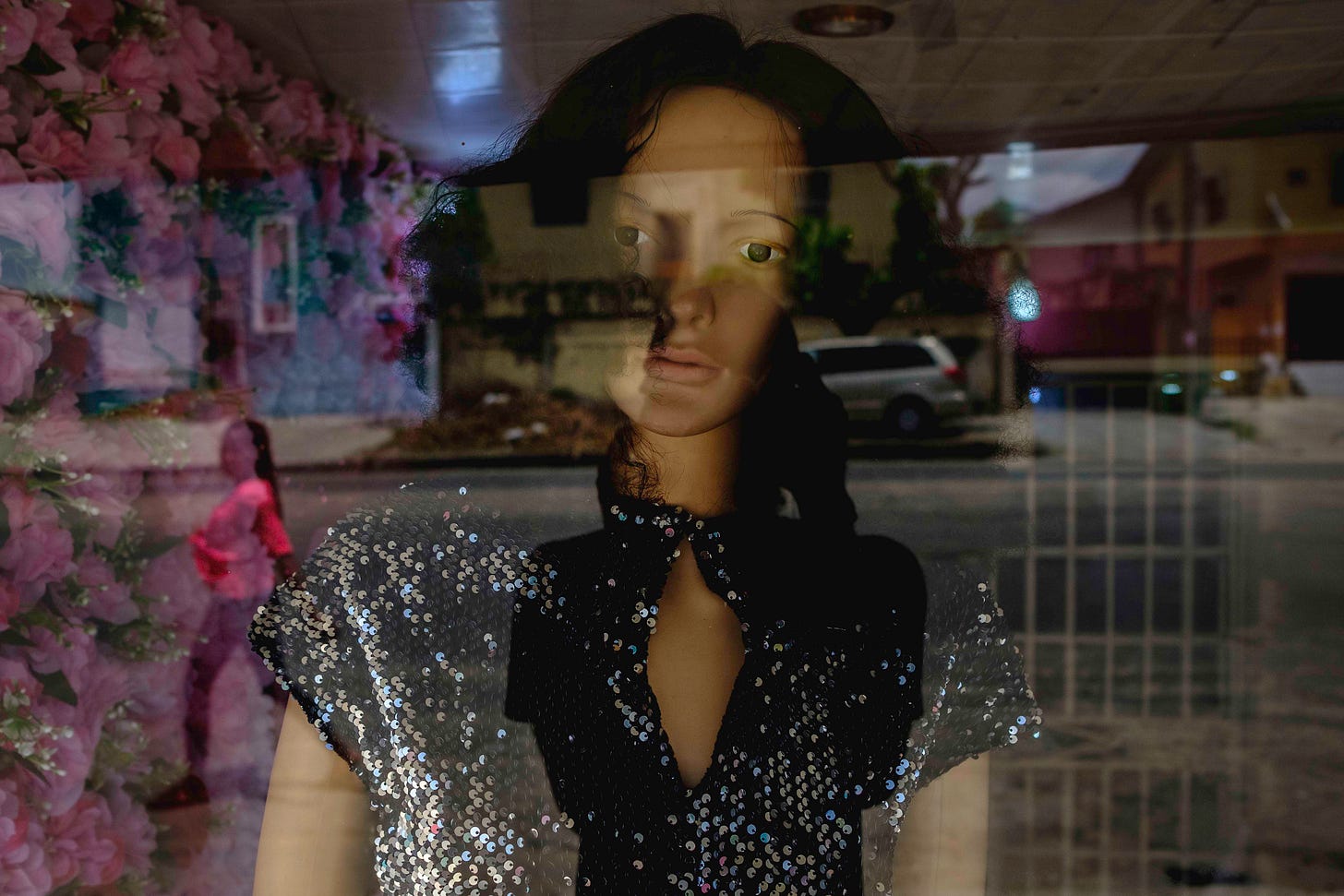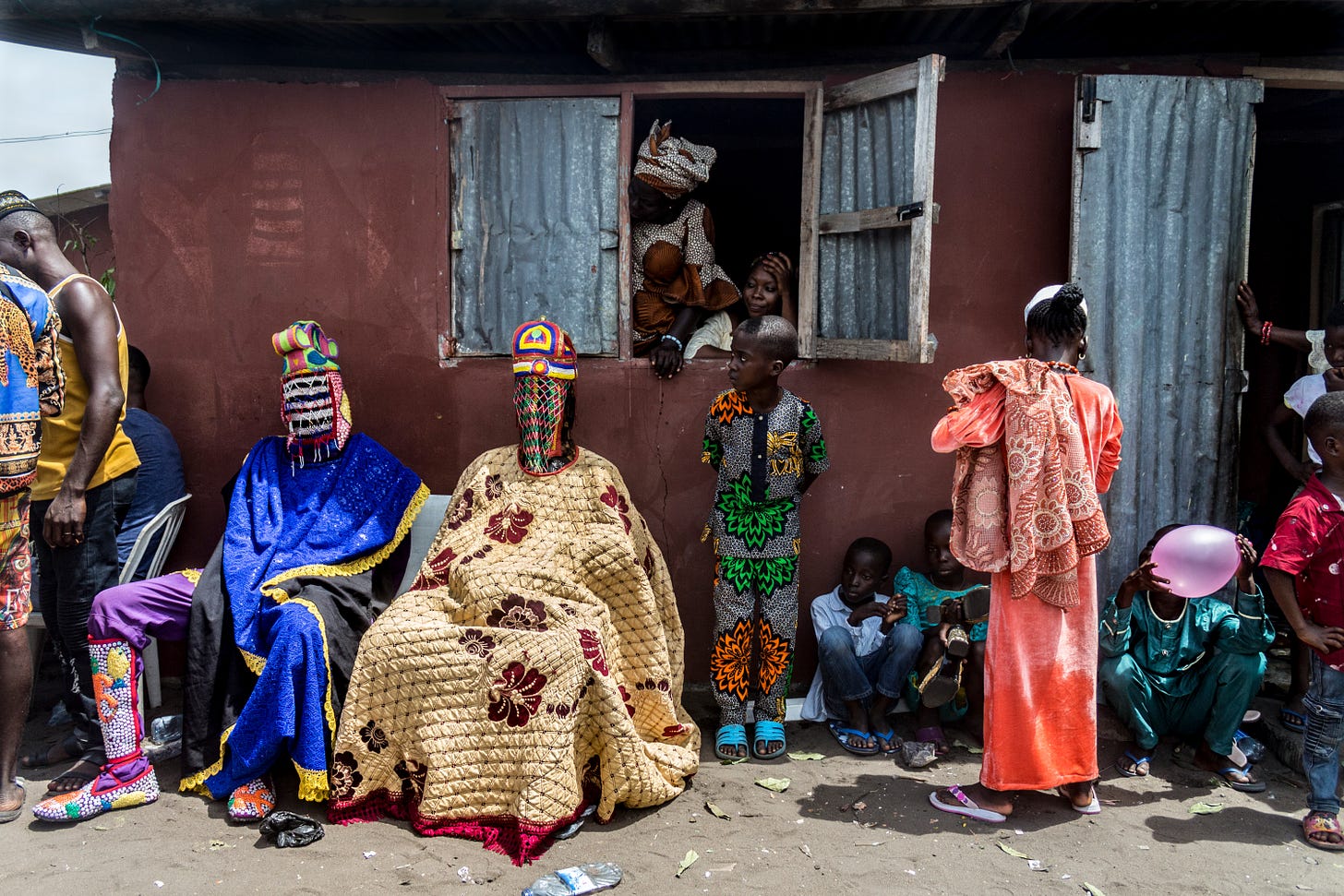Given her elaborate attiring, what seems most noticeable is the bare areas of her face. A pair of hennaed hands, which hover across her cheeks, tell of a practiced attempt to hold herself in regard. That her eyes do the estimation is evident from its stare. And what does she see? Those shimmery blotches of light? May that approximation of her image be as perfect as she imagines it should be.
— Emmanuel Iduma
“All photography is an act of projection – you project how you feel on what you see.”
This photograph was taken on one of my long night walks. I remember this day very well; I was walking so lost in my thoughts and then I saw a local wedding happening on the street in one of Cairo’s oldest neighborhoods. I went into the bride’s house and people were very warm and they instantly invited me into the bride’s room. I stayed there for a while talking and laughing with the girls but I couldn’t help but observe how the bride was so nervous and every couple of minutes she checked herself in the mirror to see if she looked beautiful.
At that moment, so many thoughts came running into my head: what is beautiful? And who decides what is beautiful? What brought me here? Is there beauty in being so lost in the world? But the more I see, the less I know. I remembered a line from a book by Tao Ching, “As soon as beauty is known by the world as beautiful, it becomes ugly.”
There is something about the intense fear in her eyes that moves something inside me. Every time I look at this photograph, I feel a different emotion. Now I feel vulnerability.
This photograph is also part of a project very close to my heart, “We’re all fugitives.” It’s a five-year project that was born purely out of personal experiences and an intense longing to express certain feelings. It came from a really genuine and vulnerable place. A desire for connection and comfort, and to understand things beyond how they seem. All the works are a reflection of a multilayered journey that is both introspective and retrospective.
It was also exhibited in a number of galleries and biennales in different countries and the feedback and support have been incredible. What made me truly happy is that it resonated with people from all walks of life. Somehow, everyone felt a connection with this series – and for that, I am truly grateful. I guess we really are all fugitives.
All my early work was related to street photography; I think it was a very important phase in my life which I cherish so much because it taught me a lot about myself and the world around me. For me, street photography is poetry and it depicts life in its most honest form. However, I believe that over the years my visual style and approach has changed and evolved – it has gotten more intimate and personal – and I think this is the beauty of the journey. Everything is connected and every phase is crucial. All the topics or issues I work on come from a very honest place inside me. Which is very therapeutic to me and allows me to pour all the emotions inside into what I’m creating. The decision to work on a certain project depends on my internal emotional state. I think all photography is an act of projection – you project how you feel on what you see. Moreover, now and for the past few years I have been working exclusively with analog. I feel like analog photography truly represents my soul and how I see the world. It soothes my constant longing to see the unedited beauty of life. For me, it is poetry and music combined together.
I love the intimate and slow pleasure of the whole process. It’s a really humbling experience, it teaches you to let go of the idea of being in control and of perfectionism; you learn to embrace and love whatever the outcome is. Sometimes too much control, thinking and planning ruin the most beautiful stories in life.
— Hana Gamal
About Hana Gamal
Hana Gamal is an Egyptian Photographer and Visual Artist. Born and raised in Cairo, she graduated from the American University in Cairo with a dual degree in Mass Communication and Media Arts and Psychology. In 2021, she completed an advanced master program in Photojournalism at The Danish School of Media and Journalism (DMJX) in Aarhus, Denmark. More of her work can be found on her website and on Instagram.
RELATED — “Oyinbo” by Bernard Kalu
On one of my regular walks, I stumbled on a mannequin in front of a clothing shop less than 2000 steps from my home; it's skin was white, and almost like a lightbulb moment, it struck me that I hadn't seen a black mannequin before, even though I lived in Africa, in Lagos to be precise.
LAST WEEK — “Onlookers” by Fawaz Oyedeji
This photograph was taken at a festival in Badagry, Lagos. I had been shooting since morning with my friend, Adetona Omokanye, who is also a photographer, and this is one of the last few images I captured that day (mid-afternoon). It’s a flamboyant yet simple picture in terms of technicality, and, to me, it reaffirms the idea that, “if you want interesting pictures, you put yourself in front of interesting things.”
This is the 141st edition of this publication. The newsletter also read on web (best for viewing images), and via the Substack iOS/Android apps.
TENDER PHOTO is a collaborative digital archive and publishing platform of contemporary African photography, edited by Emmanuel Iduma. Our aim is to use photography to engage with life on the African continent. We publish narratives about the people, places, and events pictured in photographs, contributing to nuanced and layered perceptions.
Every Wednesday we feature a photograph, a short caption about it, and a statement from the photographer. Last year, we published commentaries or photo-essays in response to photographs previously featured on the newsletter, including CORRESPONDENCES, CONCORDANCE, KINDRED, INDEX, and AFFINITIES.
Thank you for reading. If this newsletter was shared with you, consider subscribing, or forward to a friend. Please whitelist the newsletter to ensure you never miss it.





